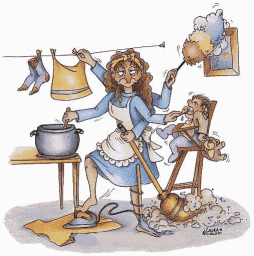Girls do 160 million more hours of chores than boys

It will come as little surprise to many that girls spend 40 per cent more time performing unpaid household chores than boys. That 40 per cent equates to a whopping 160 million more hours of chores a day undertaken by girls. In some countries, this figure is considerably higher. A new report from the United Nations children's agency UNICEF highlights this disparity. UNICEF's Anju Malhotra stated. "Girls sacrifice important opportunities to learn, grow and just enjoy their childhood." She added: "This unequal distribution of labour among children also perpetuates gender stereotypes and the double burden on women and girls across generations."
Much of the work done by girls is of a menial and physically demanding nature. Two-thirds of girls cook and clean in the home, while half collect firewood or water. They also spend a long time caring for children and elderly relatives. The country where girls work longest is Somalia. Here, girls aged between 10 and 14 years spend 26 hours a week on household chores. The report is being released to coincide with the UN's International Day of the Girl Child, which is on the 11th of October. UNICEF said: "Quantifying the challenges girls face is the first critical step towards meeting the Sustainable Development Goal on gender equality and breaking down barriers that confront the world's 1.1 billion girls."
Article Source: http://www.breakingnewsenglish.com/1610/161008-international-day-of-the-girl-child.html
Image Source: http://2.bp.blogspot.com/_zOmIfI-DrZI/SKleTFkyJLI/AAAAAAAAAJM/u1Xl9LsRkMA/s400/chores.gif
VOCABULARY WORDS:
1. Whopping (adj./informal) ~ very large
2. Perpetuate (v.) ~ make (something, typically an undesirable situation or an unfounded belief) continue indefinitely
3. Stereotype (n.) ~ a widely held but fixed and oversimplified image or idea of a particular type of person or thing
4. Barrier (n.) ~ a circumstance or obstacle that keeps people or things apart or prevents communication or progress
QUESTIONS FOR DISCUSSION:
1.What do many girls do that is unpaid?
2.Who produced a report about unpaid household chores?
3.What do girls sacrifice enjoying to do their chores?
4.What did a UNICEF spokeswoman say was distributed unequally?
5.What does the inequality perpetuate?
6.What do two-thirds of girls do?
7.In which country do girls spend longest on household chores?
8.What is the report intended to coincide with?
9.What does UNICEF want to break down?
10.How many girls are there in the world?